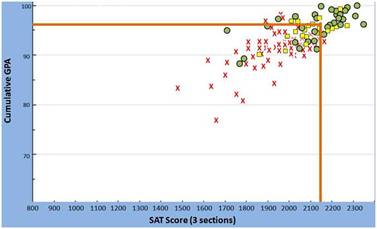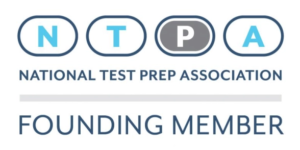Instilling A Student’s Passion for Achieving a Higher Score on the SAT/ACT
As anyone who has come to one of Edison Prep’s parent meetings has heard us say, we strongly believe that student motivation, not student starting score, is the ultimate key to success on the SAT/ACT. After working with more than 700 students, the most important variable that continues to most strongly predict a large score increase remains the same: a student’s motivation.
When students are able to combine a healthy respect for how much these tests impact college admissions with a healthy understanding of how practicable and predictable the tests are (if they put in the time to study), the stage for success is set. Once students “get it,” we have very little trouble convincing most of our students to do more than 80 hours of work prior to the test date. The key epiphany occurs when a student switches from seeing SAT/ACT preparation as a chore to an investment in his or her future.
Our 2011 results show that the shapes of the score increase graphs for homework completion and number of hours of tutoring look almost identical. Both are equally powerful factors in increasing one’s score. Neither one in isolation results in a top score increase.
A Parent’s Role:
Many parents are familiar with the famous “Tiger Mom” book / Wall Street Journal article from last year that advocated a very rigorous approach to studying and schoolwork. While some of her methods are questionable, a lackadaisical approach is equally dangerous for those planning to apply to competitive colleges. However, Tiger Mom Amy Chua makes one point that most people can agree on: “nothing is fun until you’re good at it.” As a parent, the most important role that you can play is as a cheerleader, especially until the initial score increases appear. Once students’ initial skepticism in their ability to raise their score is vanquished, they require far less coaxing and many even assign themselves extra homework.
How to Motivate Your Student to Care about Studying for the SAT/ACT
1. Help them understand that for college applications, the SAT/ACT has the same weight as multiple semesters of school grades. Students regularly spend 100+ hours on each class at school, when homework and studying is included. Given that most schools count the SAT more heavily than a dozen or more semester grades, studying for only 6 or 7 hours for the test makes no sense.
2. Show them the data. Every college publishes SAT/ACT scores for its “middle 50%” of scores on their website. Students at some schools have “Naviance” software that shows them which students from their school were admitted, waitlisted, or denied based upon their GPA and SAT/ACT score combinations, as in the graphic below. Students at schools that don’t have Naviance can still use MyChances.net, colleges’ websites, or the SAT’s own website to see how their current scores stack up.

3. Make them aware that the “Middle 50%” SAT/ACT score range is not a “field goal.” Many students view the middle 50% range like the image below: “if I’m in between those numbers, I’m good!” The truth is, if a student is to get in with no special “bumps” (e.g. athletics, parent legacy status, need for diversity (geographic, gender, racial, and otherwise)), he or she should shoot for that right goalpost of the 75th percentile to ensure the best chances of admission.

4. Encourage your student to brainstorm a college list early, if he or she hasn’t already. Frequently, students don’t know how their scores compare with colleges’ average scores and assume a given college to be far easier than it truthfully is. Once they do the research and have that “oops” moment where they realize Dream School #1 has SAT scores that are 350 points higher than their PSAT score, motivation is not as hard to come by. College tours can also help make the concept of “college” less abstract and can incite a student’s motivation to study for these tests.
5. Make them understand that testing can be as short or as long of a process as they choose to make it. Edison Prep emphasizes a strategy of “ripping it off like a band-aid”—where students prepare for consecutive tests and don’t unnecessarily drag out the test preparation. It’s neither fun nor healthy to have students drag test prep out for 14 months. Most of our students internalize the tips above and dedicate themselves to a couple months of very studious preparation, and then move on with their lives. It’s healthier that way.
6. Help them make time in their calendars. Students may need to temporarily take a step back from a few shifts at an after-school job or decide to forgo the spring play to make time for SAT/ACT preparation. Without time to do SAT/ACT homework, success is hard to come by. One of our favorite quotes to parents is, “No one has ever been rejected because their drama practice score was too low; millions of applications are rejected each year because SAT/ACT scores were too low.” Sports coaches and drama teachers may bristle at the quote, but it is true.
7. Strike the right balance between overbearing and aloof. Optimally, parents will periodically check in and ask how homework is going, how the score is progressing, and offer supportive words of advice. Congratulate them for being self-starters when you see them getting their SAT/ACT homework done early, or when you see them reviewing flashcards before dinner. For parents who are a little suspicious of homework completion, playfully calling a student’s bluff quizzing the student on some of the vocabulary words in the back of the book can be useful.
8. Avoid comparisons between siblings. There can be a wide diversity of starting score and ending score potential within a given family, and many students internalize anxiety when faced with an older brother or sister who performed amazingly well, possibly without even studying. An expectation that all siblings will score approximately the same can be detrimental to that student’s self-esteem and ultimately hinder their score increase progress.
9. Avoid this harmful phrase at all costs when in front of your student: “S/he just can’t test well. Never has, never will.” Such language reinforces the beliefs that your student may already have and can lead to stress and disengagement. A parent saying the above quote leads directly to the student saying “why bother?” If you don’t believe they can do it, why should they? Try replacing that quote above with this one: “All standardized tests, because they are objective, are predictable, and therefore practicable. So you’ll get there; it’ll just take hard work.”
10. If you see your student getting frustrated with the test, don’t instantly coddle him or her; let your student wrestle with it for a while. Most of the students who have obtained the largest score increases hit a Zen-like state of “productive frustration” that ultimately fueled some of their fastest increases. When students do a large volume of work, have improved a little bit, and can see (when looking at a graded mock test) that most of the items they are missing are of the same type, they will become more engaged and want to attack that area of concern.
One student we worked with was so consistent with his types of errors that he wanted to throw his test prep materials across the room (despite being an exceedingly polite guy). Once he internalized the quid pro quo of “if I fix these 8 verb errors, I will get 100 points more on my writing score,” the stage was set. That frustration led directly to better attentiveness on future verb questions and an eventual top 1% score on the writing section.
11. Consider agreeing to a score “end zone” with your student: a score beyond which they’ll be allowed to quit taking the test. Some students don’t want to begin practicing because they are worried that their parents will never actually allow them to stop. They delay the onset of preparation and thus often end up tutoring well into senior year, which is not ideal. Having a commitment from parents of “if you can get a score of XXXX, you’re done” can prompt them to start earlier and “rip it off like a band-aid,” as mentioned in #5.
For motivated students applying to top schools, this is less relevant: they will often assign themselves extra homework at each session. But for the student who just wants to be done already, this tactic is very effective.
We hope this provides some useful tips as your student begins preparing for the SAT/ACT. If you have any questions, feel free to contact us at edison@edisonprep.com or 404-333-8573.







